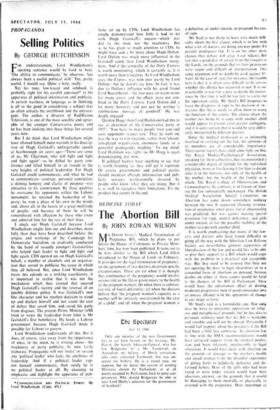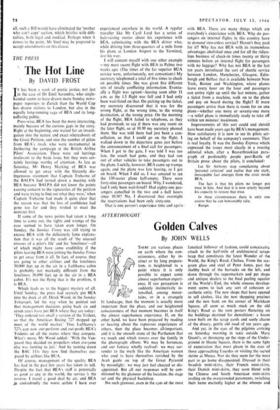The Abortion Bill MEDICINE TODAY
By JOHN ROWAN WILSON
MR DAVID STEEL .s Medical Termination of Pregnancy Bill, which he plans to put before the House of Commons in Private Mem- bers' time, has now been published. It turns out to be very similar to the Bill which Lord Silkin introduced to the House of Lords in February. It provides for the legal termination of pregnancy, on the agreement of two doctors, in certain specific circumstances. These are (a) when it is thought that continuance of the pregnancy would involve serious risk to the life or grave injury to the health of the pregnant woman; (b) when there is substan- tial risk of foetal deformity; (c) when the doctors believe that `the pregnant woman's capacity as a mother will be seriously overstrained by the care of a child': and (d) when the pregnant woman is
a defective, or under sixteen, or pregnant because of rape.
Mr Steel is not likely to have very much difb culty about the first clause, which is in line with what a lot of doctors are doing anyway under tl present inadequate law. It is on the other three clauses that debate will arise. t ord Silkin's BOP ran into a good deal of attack from the lawyers on the Lords, on the grounds that its later provisions were vague and difficult of interpretation. This same argument will no doubt be used against M Steel. In the case of rape. for instance, the trouble here is that it is often very difficult to be certain whether the offence has occurred or not. It is practicable to wait for a jury to decide the mattel since by this time it will be too late to carry out the operation safely. Mr Steel's Bill proposes to leave the diagnosis of rape to the decision of tw,, doctors. But this is surely to allow them to usurp the function of the courts. The clause about the mother not being tit to cope with another child would appear to present even greater ambiguity. and it is quite certain that it would be very differ- ently interpreted by different doctors.
Since the medical profession is so intimately involved in carrying out the law, the opinions of its members are of considerable importance. Three recent reports have shed some light on this. The Royal Medico-Psychological Association, speaking for the psychiatrists, has recommended a considerable degree of latitude for the individual physician, more or less leaving it for him to decide what is in the interests, not only of the health of the mother, but the health of the family as a whole. The Royal College of Obstetricians and Gynaecologists, by contrast, is in favour of leav- ing the law substantially unchanged. The British Medical Association Special Committee on Abortion has come down somewhere midway between the two. It suggested allowing termina- tion. of pregnancy when gross foetal abnormality was predicted. but was against making special provision for rape, mental deficiency, and girls under sixteen, or for the possible inability of the mother to cope with another child. It is worth emphasising that many of the law- yers and doctors who have found difficulty in going all the way with the Abortion Law Reform Society are nevertheless genuine supporters of liberalisation of the law and would like to be able to give their support to a Bill which would cope with the problem in a practical and acceptable way. But they need to be assured that they are not opening the door to legal absurdities or to a concealed form of abortion on demand. Serious doubts on either of these counts would be fatal to the chances of the Bill in Parliament. They would have the unfortunate effect of driving moderate progressive men of good conscience into an Uneasy alliance with the opponents of change in any shape or form.
Mr Steel's task is a formidable one. Not only does he have to overcome opposition on religi- ous and metaphysical grounds, but he has also to persuade ordinary men that his Bill is workable and sensible and will not be abused. Personally I would feel happier about his prospects if the Bill had been a little less ambitious. An abortion law in line with the BMA recommendations would have attracted support from the medical proles, sion and been relatively invulnerable to legal objections. It would have dealt with abortion on the grounds of damage to the mother's health and saved women from the dreadful experience of giving birth to helplessly defective and de- formed babies. Most of the girls who had been raped or were under sixteen would have their abortions anyway, on the grounds that it would be damaging to them mentally or physically to proceed with the pregnancy. Most important of all, such a Bill would have eliminated the 'mother who can't cope' section, which bristles with diffi- culties, both legal and medical. Perhaps when it Comes to the point, Mr Steel may be prepared to accept amendments on this clause.































 Previous page
Previous page